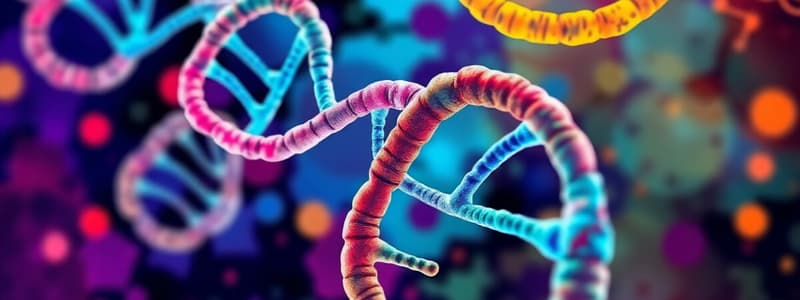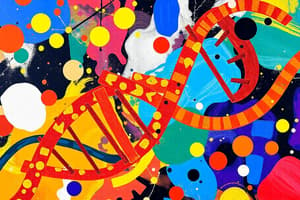Podcast
Questions and Answers
How many pairs of chromosomes are present in every somatic cell of humans?
How many pairs of chromosomes are present in every somatic cell of humans?
- 23 pairs (correct)
- 24 pairs
- 46 pairs
- 22 pairs
What term describes a gene that is present in two loci of homologous chromosomes?
What term describes a gene that is present in two loci of homologous chromosomes?
- Homologous
- Heterozygous
- Chromatid
- Allele (correct)
Which part of a gene serves as the binding site for RNA polymerase and transcription factors?
Which part of a gene serves as the binding site for RNA polymerase and transcription factors?
- Exon
- Enhancer
- Intron
- Promoter (correct)
What are the segments of coding sequences within a gene called?
What are the segments of coding sequences within a gene called?
What defines a homozygous allele?
What defines a homozygous allele?
What best describes the primary characteristic of eukaryotic cells?
What best describes the primary characteristic of eukaryotic cells?
How is the genetic material in prokaryotic cells typically organized?
How is the genetic material in prokaryotic cells typically organized?
What is true about the human genome?
What is true about the human genome?
What distinguishes eukaryotic DNA from prokaryotic DNA?
What distinguishes eukaryotic DNA from prokaryotic DNA?
Which of the following statements about cell division is correct?
Which of the following statements about cell division is correct?
What aspect of eukaryotic genomes is more complex compared to prokaryotic genomes?
What aspect of eukaryotic genomes is more complex compared to prokaryotic genomes?
Which type of cells is characterized by having no nuclear membrane?
Which type of cells is characterized by having no nuclear membrane?
What is the arrangement of chromosomes in the human genome?
What is the arrangement of chromosomes in the human genome?
What is the primary role of ribosomal RNA (rRNA) in protein synthesis?
What is the primary role of ribosomal RNA (rRNA) in protein synthesis?
What process is involved in the addition of a poly (A) tail to RNA?
What process is involved in the addition of a poly (A) tail to RNA?
Which statement accurately describes transfer RNA (tRNA)?
Which statement accurately describes transfer RNA (tRNA)?
Which of the following is NOT a minor class of RNA mentioned?
Which of the following is NOT a minor class of RNA mentioned?
In the context of molecular biology, which application does NOT relate to rRNA?
In the context of molecular biology, which application does NOT relate to rRNA?
What is the primary function of messenger RNA (mRNA)?
What is the primary function of messenger RNA (mRNA)?
Which of the following best describes microsatellites?
Which of the following best describes microsatellites?
What is the purpose of splicing in mRNA processing?
What is the purpose of splicing in mRNA processing?
Where are telomeres located and what is their primary function?
Where are telomeres located and what is their primary function?
Which type of RNA carries amino acids to ribosomes during protein synthesis?
Which type of RNA carries amino acids to ribosomes during protein synthesis?
What distinguishes hypervariable minisatellites from other types of DNA sequences?
What distinguishes hypervariable minisatellites from other types of DNA sequences?
What are tandem repeats classified based on?
What are tandem repeats classified based on?
Which of the following statements about RNA is true?
Which of the following statements about RNA is true?
Which nitrogenous bases in DNA form 2 hydrogen bonds with each other?
Which nitrogenous bases in DNA form 2 hydrogen bonds with each other?
What is the role of hydrogen bonds in the double helix structure of DNA?
What is the role of hydrogen bonds in the double helix structure of DNA?
What is the direction of the DNA chain?
What is the direction of the DNA chain?
Which of the following is not a component of a nucleotide in DNA?
Which of the following is not a component of a nucleotide in DNA?
What classifies nuclear DNA?
What classifies nuclear DNA?
How many hydrogen bonds do guanine and cytosine form?
How many hydrogen bonds do guanine and cytosine form?
Which type of DNA contains 37 genes coding for proteins involved in oxidative phosphorylation?
Which type of DNA contains 37 genes coding for proteins involved in oxidative phosphorylation?
Which of the following best describes the structure of deoxyribonucleotides?
Which of the following best describes the structure of deoxyribonucleotides?
What characterizes the major and minor grooves of DNA?
What characterizes the major and minor grooves of DNA?
Which element is found in the phosphate backbone of a DNA molecule?
Which element is found in the phosphate backbone of a DNA molecule?
Which of the following statements about purines and pyrimidines is false?
Which of the following statements about purines and pyrimidines is false?
What is the functional significance of phosphodiester linkages in DNA?
What is the functional significance of phosphodiester linkages in DNA?
How many base pairs are typically present in one turn of the DNA double helix?
How many base pairs are typically present in one turn of the DNA double helix?
Flashcards are hidden until you start studying
Study Notes
Molecular Biology Overview
- Focuses on macromolecules essential for life: nucleic acids and proteins.
- Overlaps with genetics and biochemistry.
Eukaryotic and Prokaryotic Cells
- Eukaryotic cells: found in animals, plants, fungi; true nucleus with nuclear membrane.
- Prokaryotic cells: unicellular organisms like bacteria; genetic material dispersed in cytoplasm, no nuclear membrane.
- Eukaryotic genome: complex, distributed among multiple chromosomes; DNA is linear complexed with proteins (nucleoproteins).
- Prokaryotic DNA: circular molecule, naked (without proteins).
Cell Division
- Eukaryotic division: mitosis.
- Prokaryotic division: binary fission.
Genome and Genes
- Genome: total genetic material of an organism, encoded primarily in DNA (or RNA for some viruses).
- Human genome: 23 pairs of chromosomes (22 autosomes, 1 sex chromosome).
- Germ cells have half the chromosome number of somatic cells.
- Gene: segment of DNA or RNA coding for protein; basic unit of heredity located at specific points called loci.
Alleles and Gene Structure
- Alleles: variations of a gene, present in homologous chromosomes; they can be homozygous (identical) or heterozygous (different).
- Most genes consist of exons (coding sequences) and introns (noncoding sequences), with promoter regions for RNA polymerase binding.
Nucleic Acids
- Nucleic acids are polymers of nucleotides; DNA (Deoxyribonucleic Acid) and RNA (Ribonucleic Acid).
- DNA structure includes:
- Double helix stabilized by hydrogen bonds.
- 4 bases: adenine (A), guanine (G), cytosine (C), and thymine (T).
- 5’ to 3’ directional chain.
Types of DNA Sequences
- Nuclear DNA: includes genes and extragenic DNA (active and inactive).
- Mitochondrial DNA: circular double strand DNA with 37 genes for oxidative phosphorylation.
Extragenic DNA
- Tandem repeats: repetitive sequences located together; classified into:
- Satellite DNA: large nucleotide repeats.
- Minisatellite: 10-60 bp repeats.
- Microsatellite: 2-8 bp repeats; associated with hereditary disorders.
RNA Classes
- Three major RNA types:
- Messenger RNA (mRNA): encodes protein synthesis; undergoes splicing, capping, and polyadenylation.
- Transfer RNA (tRNA): carries amino acids to ribosomes for polypeptide chain assembly.
- Ribosomal RNA (rRNA): structural and functional component of ribosomes, essential for protein synthesis.
Applications of Molecular Biology
- Research: foundational for genetic studies.
- Diagnosis: assists in identifying genetic diseases.
- Transplantation: compatibility testing.
- Forensic analysis: DNA profiling for criminal justice.
- Gene therapy: seeks to treat genetic disorders.
- Drug design: innovates pharmaceuticals based on molecular mechanisms.
Studying That Suits You
Use AI to generate personalized quizzes and flashcards to suit your learning preferences.




